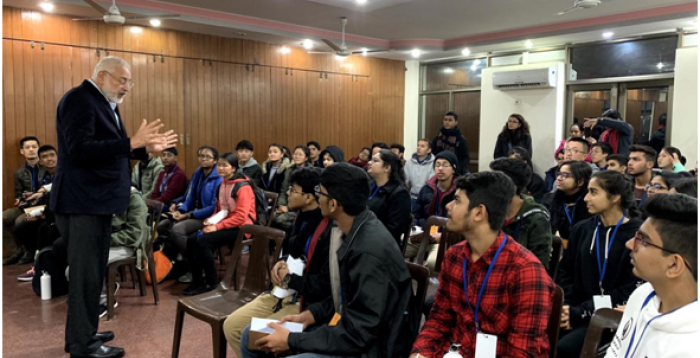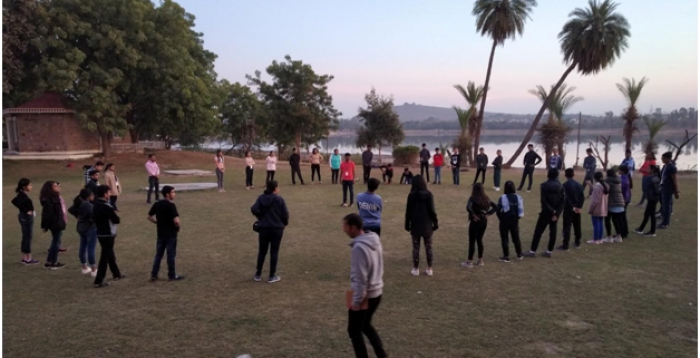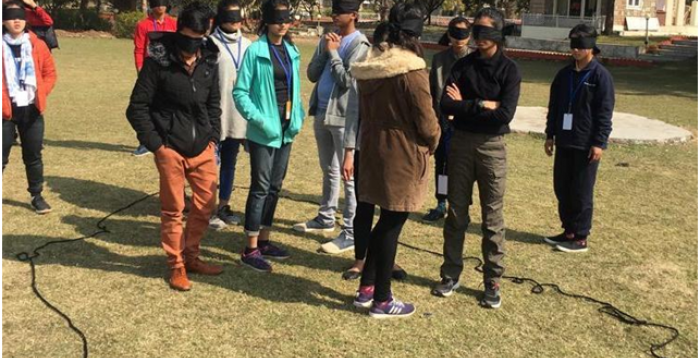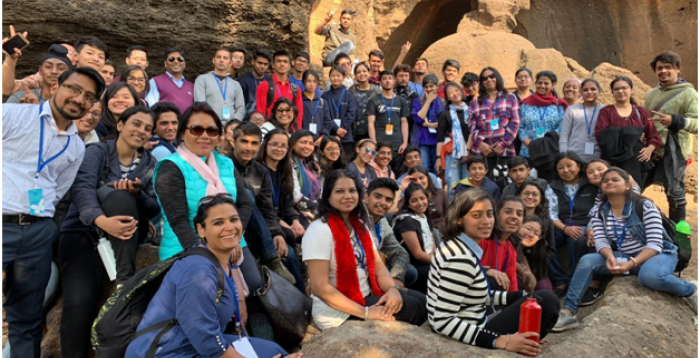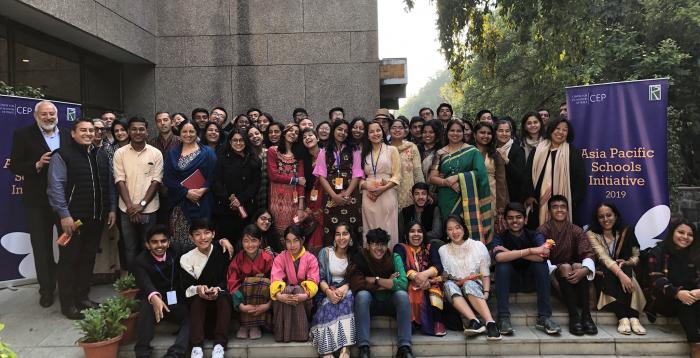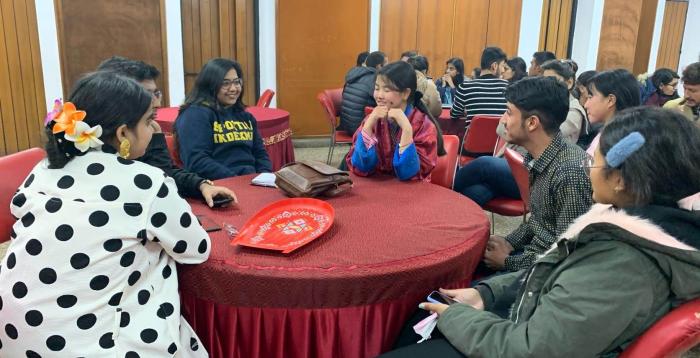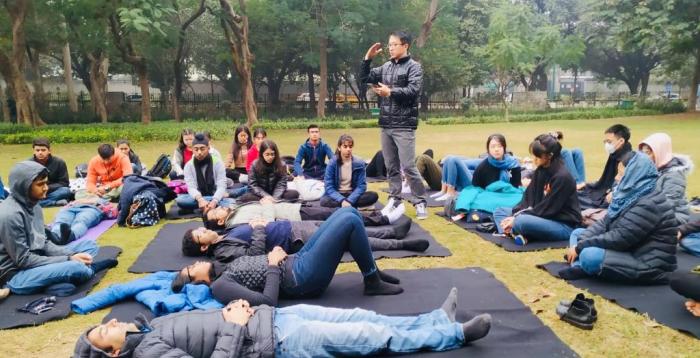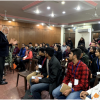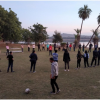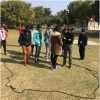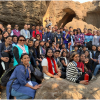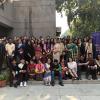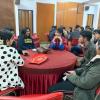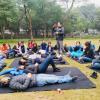The Asia Pacific Schools Initiative, a yearlong programme for school students aged 14 – 17, focuses on inculcating ‘Leadership through Serene Strength’ and building a ‘network of future leaders’ in the Asia Pacific region. First introduced in 2017, Centre for Escalation of Peace conducted the second edition in 2019.
January 6 – 19, 2019: The Foundation Programme
The second edition of the Asia Pacific Schools Initiative programme, ‘Leadership through Serene Strength,’ started in January 2019 with participating teams of 3 students and 1 teacher from Thailand, Bhutan, Bangladesh, Nepal, Afghanistan and the United Arab Emirates, along with seven schools from Delhi, Ajmer, Jhalawar and the Tibetan Children’s Village, Dehradun. In all, there were 56 participants, who spent 2 weeks together in Delhi and Jhalawar undergoing various learning experiences which included field visits, sports, theatre and stimulating academic presentations and discussions.
The programme started with an elaborate discussion on the mission and purpose of APSI – the meaning of leadership, watermarks, core skills and assessment as a tool for development. This was followed up by sessions on Five Areas of Development and creation of individual roadmaps. There were discussions on compassion, rigour, resilience, comprehension, collaboration, reflection, self-regulation, feedback, assessment and the meaning of constructive criticism. Leadership being a verb and not a noun was understood through intense experiential learning and participants absorbed the values of leadership through serene strength. Sports, theatre and cultural activities added the fun element but also reinforced the core values of the programme and contributed to team building.
These intense experiences and discussions resulted in formation of common interest groups which became project teams in the areas of Philosophy, Aesthetics, Environment, Evolution of Society and Community, and Economy and Livelihood. The team members in the project groups were from different schools, regions and countries.
Each school team went back with three tasks: implementation of individual roadmap in five areas of development, school project that the team would execute in the school with the involvement of peers, and the interschool projects.
To read the Foundation Programme Report, please click here.
February – November 2019
In order to ensure smooth communications and connectivity, the APSI core team had planned three checkpoints to touch base with all the school teams. The first one was in April/May, the second one in July/August and the third one in October/November. It was relatively easy to connect to each school team and have a video conference. But getting the entire project teams from different schools, countries and time zones proved to be a difficult and time consuming exercise. The different internet policies of each country compounded the problem. We also used Google Form to get updates from individual participants.
Another complication that came up was the dates for the Concluding Programme in Delhi. It was originally scheduled for November, but many schools found it inconvenient as it would be close to school exams or pre-boards. There was a lot of back and forth and it was virtually impossible to find dates that suited everyone. Finally, 19 – 24 December was agreed upon by everyone for a shorter and compact programme and we decided to go ahead with that. Even then, one school could not make it as their exam dates changed due to unscheduled break because of air pollution in Delhi-NCR and clashed with the programme dates.
There were further dropouts as two student participants got scholarship to study abroad, so they dropped out of the programme. Two students fell ill in December and could not join the Concluding Programme and a couple of other students were caught up in College entrance exams. So despite our best efforts to be flexible with dates, we had only 41 participants as compared to 52 participants that we had started with in January. This was definitely a setback, but the spirit remained as high in the Concluding Programme as it was in the beginning.
19 – 23 December 2019: The Concluding Programme
The Teams checked in at the Viswa Yuvak Kendra on the 19th December and the bond among the students was palpable.
The programme officially started in the evening with a warm welcome from the Core Team. The aims and objectives of the programme were reiterated with a brief discussion on what “Leadership through Serene Strength” had meant for each one of the participants.
The objective of the Concluding Programme was to bring closure to the three tasks they had set out to do individually, as a school team and as an inter-school project team.
Each participant had written a reflective essay on the year-long personal journey to raise the bar in Five Areas of Development. Most essays were honest and talked about successes as well as challenges. It was heartening to see them acknowledge that at times they had been too optimistic in setting their targets and they soon felt the need to modify it to make it more realistic. They also accepted that they fell short of achieving some of their targets, but they see it as a lifelong task and therefore they continue to strive to become better at it.
Each School Team had come prepared with a poster to present their school project. Some of the themes undertaken as a school project were skill development in the under-privileged section in the local community and in their own school’s auxiliary staff. Some worked on development of social skills while others worked on communication skills. One school even ran a campaign against the use of swear words through reflective practices amongst fellow students. There were recycling of school resources and upscaling waste as themes of their projects. Some took up cleanliness and awareness drive which included street plays; and another school lobbied with local politician and involved community leaders and members to plan sustainable garbage disposal systems. One school team developed its own organic farm inspired by one of the learning experiences in the Foundation Programme. Another school found the creation of roadmaps – an exercise learnt from APSI programme - such an important tool and a skill that they decided to share it in their school through presentations and workshops. We had a Gallery Walk to showcase the school projects where each team tried to explain to the others what they had achieved in their projects.
Ample time was provided to the Inter-school project groups to put together their project because this was the first time the whole group was meeting in person after the initial work during the Foundation Programme. The final presentations were made during the Valedictory Function. The presentations were backed by evidence as the groups had photographs, surveys, videos and other relevant documents to showcase the work done by them.
-
The Philosophy Group explored the question “Why the why?” or the need to ask questions that help one delve deeper and reflect better, which leads to self- development.
-
The group working on Evolution of Society and Community tried to “Trace the Spatial Evolution of LGBTQ Community” in a historical sense and tried to look at the present scenario in each of the participants’ countries. The project group found it a great learning to see that the different countries have very different views on the social and political standing of the LGBTQ Community, yet their presence or their blessings are considered ‘auspicious’ in many social occasions.
-
The Aesthetics Project Group deconstructed the term aesthetics to mean cultural, environmental and aesthetics of self. Cultural aesthetics was explored in the traditional art of pottery making and the folk art forms that are on the verge of extinction. Environmental aesthetics was discussed in terms of keeping personal spaces organised and clean; and the aesthetics of self was interpreted as self-worth and self-respect developed through development of confidence, personality and charm.
-
The Environment Group looked at protecting the environment through waste collection and segregation, zero waste campaign, vegetable farming, tree plantation drive and raising public awareness through multimedia, rallies and demonstrations.
-
The Economy and Livelihood Group worked in different locations but with common objectives of creating an awareness of how different people earn their livelihood in different situations: as refugees, as illegal immigrants and as a tribe that follow traditional arts. Some of the members worked to help the less privileged to earn their livelihood by empowering them through education.
The five days were intense with long hours of work. Each day began with a guided meditation session and ended with cultural presentations by different schools. The students and teachers alike spent a lot of time with each other, getting to know each other and understanding different cultures. The teams started leaving on the night of the 23rd December and the last team left on the morning of 25th December, each one very happy with the experience and excited about the prospect of continuing to work on their roadmaps.
At the end of the programme, each participant received a certificate and a portfolio which recorded their growth during the programme. The portfolio partly consisted of observations of faculty and peers, but mostly self-assessment and self-reflection. They became a part of the APSI Alumni and looked forward to staying connected with each other and the programme in the future.
To read the Concluding Programme Report, please click here.

